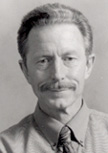Although he has been in his role as chairman of the Department of Pharmaceutical Sciences in the College of Pharmacy only since July 1, Dennis Robinson, Ph.D., has clear goals for the coming year.

“Drug delivery research is our strength, and by building upon this strength, we can enhance the research activities and increase collaborations on campus, with other universities as well as industry,” Dr. Robinson said.
He said a top priority this year is to hire three faculty members, two of whom will be recruited with the aid of funds received through the UNMC Tobacco Settlement Biomedical Research Development Fund. Another priority is to gain approval to establish a Center of Excellence in Drug Delivery Research that would involve researchers on the university campuses in Omaha and Lincoln. With one of the largest basic science, graduate programs on campus, the strength of the Pharmaceutical Sciences Graduate Program (PSGP) is very important to the research activities in the department, Dr. Robinson said. An aim is to increase the number of highly qualified U.S. students in the PSGP.
“Hence, I have charged Dr. Vinod Labhasetwar, the chair of the Pharmaceutical Sciences Graduate Program, to develop and implement an active recruitment program,” Dr. Robinson said.
Clarence Ueda, Pharm.D., Ph.D., dean of the College of Pharmacy, recruited Dr. Robinson to the College of Pharmacy from his native New Zealand in 1986. Dr. Robinson has been a faculty member at UNMC since then, and he has served as interim chairman of the Pharmaceutical Sciences Department twice, in the past. Dr. Robinson’s familiarity with the pharmacy faculty, and with the university and campus is an advantage, Dr. Ueda said.
“There are times when an internal candidate is the right choice because of timing; this is one of them,” Dr. Ueda said. “Dr. Robinson’s appointment to this position is important to the college at this time.”
Dr. Ueda said he looks forward to working with Dr. Robinson in advancing the programs of the department, especially its research program.
Dr. Robinson replaces Peter Kador, Ph.D., who resigned as the department chair on June 1.
“I am a great believer in teamwork, and I firmly believe that the faculty is the department’s greatest resource,” Dr. Robinson said. “Hence, it is my responsibility to ensure there is a positive working environment that facilitates the career growth and development of every member.”
Dr. Robinson’s active interest in drug delivery research began almost 30 years ago, when he commenced his graduate studies. While interested in both chemical and physical approaches to innovations in drug delivery, most recently he has been involved in the controlled delivery of peptides, anticancer agents and antibiotics using biodegradable microspheres, nanospheres, implants, films and in situ-forming gels.
“We should never lose sight that universities exist because of teaching programs,” Dr Robinson said. “Academic rigor is vital. The college has completed an extensive revision of the professional program, and last year we began a review of the graduate courses in the department, which is ongoing. We need to ensure that the content of all courses addresses the career needs of our graduates.”